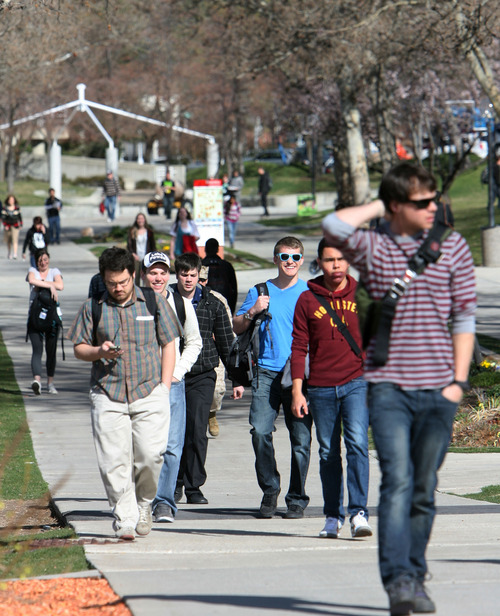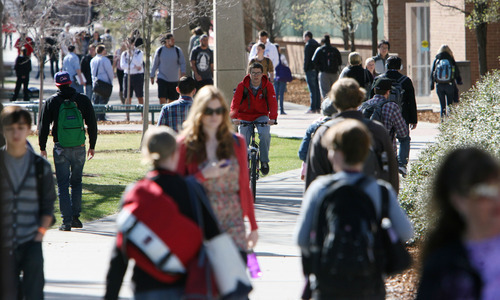This is an archived article that was published on sltrib.com in 2012, and information in the article may be outdated. It is provided only for personal research purposes and may not be reprinted.
Tuition at Utah's public universities and colleges will rise between 4.5 and 7 percent for next school year under hikes approved Friday by the state Board of Regents.
While still a substantial bump in the cost of college — by about $220 a year on average for full-time undergraduates — the increases are not as steep as the near double-digit hikes of recent years, and comprise the lowest overall tuition boost in a decade, according to William Sederburg, Utah's commissioner of higher education. Regents credited lawmakers' decision this session to raise higher education funding after three years of cuts.
"Prior to this year, state support for our colleges and universities was on the decline," said a news release quoting Regents chair David Jordan. "We are grateful the legislature saw to fund higher education this year so that we may keep tuition increases at a minimum. As state budgets improve in the future, we hope the legislature will invest in higher education in a way that allows us to further limit tuition increases."
Regent Meghan Holbrook cast the lone vote against the tuition hikes, which would raise $30 million to $35 million.
The money will cover a portion of the 1 percent salary increases the Legislature approved for campus employees, hikes in health insurance premiums, merit and retention pay raises, and myriad non-personnel costs associated with instruction, programs and campus operations.
"Obviously we are happy to see a lower increase in tuition," said student Thomas Leavitt, a non-voting regent from Dixie State College. "We want to ensure our education is quality and we understand that we have to pay to get the best professors, but we want to make sure we are not overpaying."
Under Utah's two-tier tuition structure, Regents set the first tier, common to all eight of the state's colleges and universities, at 4.5 percent. The institutions' trustees requested second-tier increases as high as the 2.5 percent sought by Snow College. The small Ephraim community college remains Utah's least costly stand-alone school and its hike is still among the state's smallest.
No second-tier hikes will be imposed on the state's two largest open-enrollment schools, Salt Lake Community College and Utah Valley University. Students at these schools will see their annual tuition rise by $119 and $178, respectively, next year.
"Tuition that is within our responsibility must stay low. It's about staying true to our mission," said SLCC President Cynthia Bioteau. "We look at reallocating resources rather than automatically raise tuition. We have to support career programs that will not only get them jobs, but jobs that pay a living wage."
Meanwhile, Snow and SLCC sought no increases in the mandatory fees changed to students for non-academic services.
While Utah's selective universities remain relative bargains compared with their out-of-state peers, SLCC's 2012-13 tuition ($2,759 for a full-time in-state student) is equivalent to and in some cases higher that other states' community colleges.
"Utah's colleges and universities need to raise tuition in order to fund the institution's portion of employee compensation and meet the demand of enrollment growth," Sederburg said.
Regents also approved increases in mandatory non-tuition fees at six Utah colleges and universities, the biggest at Utah State University and Southern Utah University. At both schools, the steep fee increases are pegged to investments in athletics and recreation. USU students voted to approve a $25 per-semester levy as the first step in a series of fee hikes for the Logan campus' proposed recreation center and upgrades to the intramural fields.
In SUU's case, a near doubling of the athletics fee to $204 a year will support the Thunderbirds switch to the Big Sky Conference. The Cedar City university reduced and phased out other fees.





